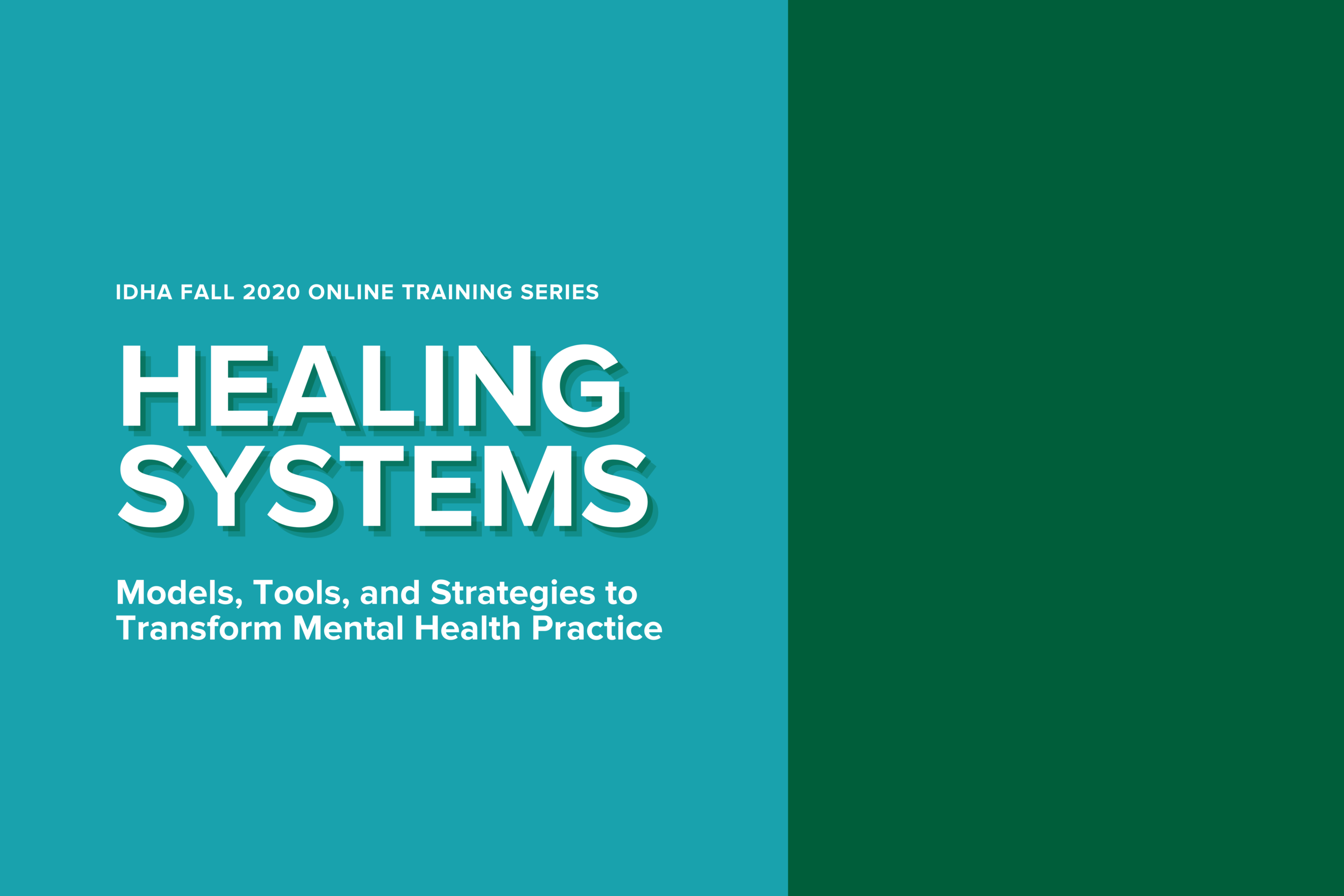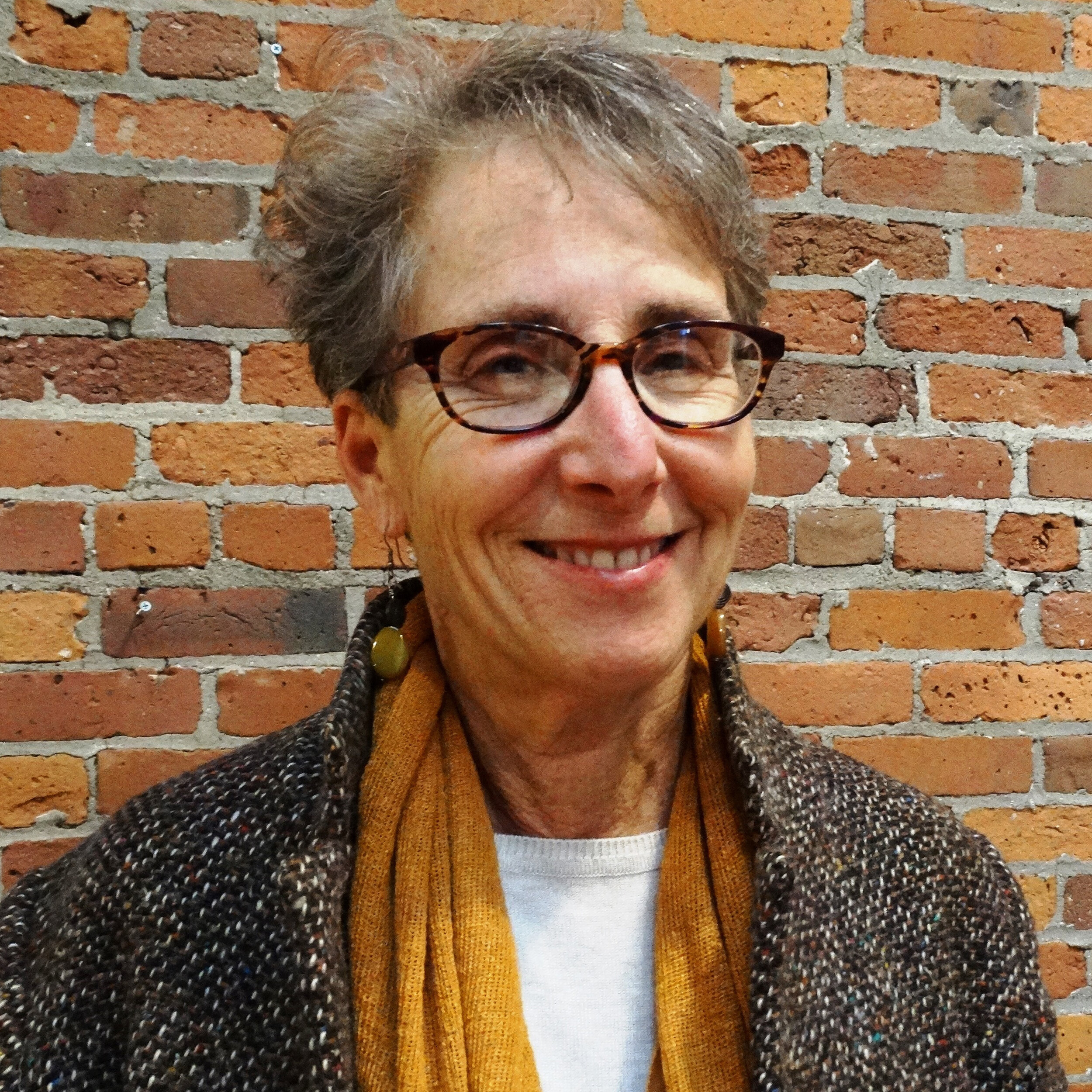Is the mental health system not giving you the tools you need to support people in genuine and holistic ways?
Are you seeking to train with like-minded professionals exploring personal and collective healing?

ENROLLMENT IS NOW CLOSED FOR HEALING SYSTEMS
THANK YOU TO ALL WHO JOINED US!
Series Overview
The pandemic state of the world demands a long overdue systemic revolution. Once trusted institutions are shaking, making way for a future of possibility and transformation beyond our cultural imagination. We need more systems built from the heart up, not from the head down, and have rediscovered a simple truth: individuals and their communities can heal themselves.
IDHA’s Fall 2020 live online training series seeks to think beyond “how to” style skills trainings in order to advance a new narrative that breaks down power asymmetries, creates space for critical dialogue, and acknowledges the societal and structural factors that contribute to inequity, trauma, and what some call mental illness. The series’ three sessions will cover a variety of perspectives from experts in life and in work to explore systems at every level: oppressive societal structures and institutions, communities and networks of individuals, and the systems we embody.
Schedule
All classes are held on Saturday afternoons, from 12:00 - 2:30 pm EST.
Systems Thinking: Deconstructing the Landscape of Social Services
October 24, 2020
Participatory Approaches to Treatment and Healing: Adaptations of Open Dialogue
November 21, 2020
Embodied Transformation: Somatics & Internal Family Systems
December 12, 2020

“One of the best trainings I have ever attended - a heart-centered, empathetic, person-centered space. Phenomenal speakers and topics! All very rich and valuable. Information is dense but presented in a very approachable and relatable way.”
—IDHA training participant, Experience Transforms Practice
Systems Thinking: Deconstructing the Landscape of Social Services
Saturday, October 24, 2020
12 - 2:30 pm EST
Facilitated by Milta Vega Cardona and Robin Schlenger
This course is eligible for 2.5 CE clock hours. Click here for more information.
Course content level: Introductory
At the center of the movements for social and racial transformation is the question of power: who has it, how they got it, how we change our thoughts and feelings about it, and how it is being used and mis-used. Power is housed, and perpetuated, in various systems and institutions — from the criminal justice system, to the education system, to the economic system, to the legal system, to the housing system — all of which influence the way we conceptualize and talk about mental health. They not only affect us as individuals, but shape the way in which services and care are delivered.
In this session, we will begin to identify our capacity for it and shift the existing paradigms and ideology about power in our lives, community, and institutions. We will examine how various systems of power intersect, and provide concrete strategies for how those of us working both within and outside of the system can begin to acknowledge the impacts of structural oppression on our well being, and make concrete shifts in the direction of more liberation and justice.
Learning objectives:
- Acquire a systems and power analysis in the context of mental health service delivery and care
- Understand the various intersecting systems of oppression present in the United States
- Understand the influence of race and ethnicity on mental health diagnosis
- Appreciate the importance of an intersectional approach to making structural change
- Understand the socialization process which leads to the belief systems contributing to pervasive inequities in both our personal lives and our institutions
- Recognize the historical development and codification of race in the United States, as it unveils the mirage created about race and racism
Agenda:
- Introductions, welcome, and check-in (5 min)
- Historical overview of codified race, institutional power, and their effects and influence (70 min)
- Break (5 min)
- Socialization and implicit bias (15 min)
- Intersecting systems of power and oppression in the US (25 min)
- Breakout group discussion (15 min)
- Group reflection and closing comments (15 min)
Milta Vega Cardona is a National Anti-Racism / Anti Oppression Consultant providing support in organizing and curating conversations on Race and Racism in the United States, Virgin Islands and Puerto Rico. She is a 15-year contributor and Core trainer to the People Institute for Survival and Beyond, and she credits them with her foundational understanding of the roots of racism in the USA. Milta’s 45 years of service and advocacy, administration and Principal of Programing in the Human Service Field has taken her through the Substance Abuse Epidemic in the USA, the HIV Pandemic in the USA and Virgin Islands and Puerto Rico and Presently Covid-19.
Robin Schlenger, LCSW has many years of clinical and supervisory experience working in the nonprofit and public sectors. She is a therapist, clinical supervisor, and a White Anti-Racist Consultant, Coach and Organizer. Robin is on the leadership team of European Dissent (ED) which is an Affinity Group of The People's Institute of Survival and Beyond. ED is a group of people of European Decent who "dissent" from the ideology of white supremacy and organize together with other whites and people of color to undo racism. Robin received her Masters in Social Work from New York University and has also studied Psychodrama, Drama Therapy, Playback Theater and restorative conversations which she uses in her work. She has extensive experience in facilitating difficult dialogues and conversations about difference with a focus on growth, healing, and repairing.

Participatory Approaches to Treatment and Healing: Adaptations of Open Dialogue
Saturday, November 21, 2020
12 - 2:30 pm EST
Facilitated by Facilitated by Ro Speight & Sandy Steingard
This course is eligible for 2.5 CE clock hours. Click here for more information.
Course content level: Introductory
This class offers a broad overview of dialogic practices in mental health, including Open Dialogue as developed in Tornio, Finland and adaptations of this approach in the United States. Open Dialogue draws on humanistic and systems theory to create a space for people in distress and their social networks to engage in dialogue as a way to both understand and navigate difficult periods. Decisions about treatment and next steps are made in a collaborative, non-coercive and transparent way. This class includes both didactic and experiential components to meet these objectives.
Learning objectives:
- Discuss the history, promising research and relevance of dialogic practices in the U.S.
- Define the seven key principles of Open Dialogue
- Explain several adaptations of the Open Dialogue approach in the U.S.
- Discuss the importance of reflections as used in social network meetings
- Analyze the potential for dialogic approaches to address underlying epistemological power differences and social justice issues in mental health service systems
- Identify ways to practice dialogic approaches through an experiential exercise
- Introductions, overview, and history of Open Dialogue (20 min)
- Discussion of collaborative network approach in Vermont and Parachute in NYC (25 min)
- Peer-supported Open Dialogue (20 min)
- Break (10 min)
- Reflection introduction and exercise (45 min)
- Group reflection and closing comments (30 min)
Dr. Sandra Steingard serves as Board Chair of the Foundation for Excellence in Mental Health Care. She is Clinical Associate Professor of Psychiatry at the College of Medicine of the University of Vermont. She worked for over 25 years in community mental health where her clinical practice primarily included patients who experienced psychotic states.
Ronda "Ro" Speight is a Human Rights Advocate and NYCPS Peer Specialist. She is also a Co-trainer and Facilitator for Peer Supported Open Dialogue Approach and Practice.
Embodied Transformation: Somatics and Internal Family Systems
Saturday, December 12, 2020
12 - 2:30 pm EST
Facilitated by Facilitated by Deran Young, LCSW and Sumitra Rajkumar
This course is eligible for 2.5 CE clock hours. Click here for more information.
Course content level: Introductory
This course joins together two distinct, but interconnected, modalities that address the multiplicious, complex systems within our bodies and minds: Somatics and Internal Family Systems (IFS) therapy. Both are emerging liberatory models of working directly with individuals and groups and offer alternative tools and worldviews beyond the mainstream medical model.
The Somatics section of this course will explain the main theoretical framework of somatics and explore foundational practices. Somatics regards the body as a core, albeit unconscious, part of one’s sense of self and relationships. A politicized somatics regards the body as conditioned by a range of social forces and unequal power dynamics. The therapeutic method involves developing a bodily awareness of how habit, reactivity. and trauma responses might persist in the body.
The second section will give an overview of IFS, a transformative, evidence-based model of psychotherapy, with the goal of exploring how racism and structural oppression impact inner psychic systems. IFS holds that the mind is naturally multiple; our inner parts contain valuable qualities and our core Self knows how to heal, allowing us to become integrated and whole. IFS is a new, empowering paradigm for harmonizing the mind and human systems, and has significant potential to help individuals heal and the world to become a more compassionate place.
Learning objectives:
- Summarize the concept of a “politicized somatics” to support healing
- Discuss how to see a client through an “Arc of Transformation”
- Explain centering as a foundational practice
- Define Internal Family Systems and the power of thinking systemically
- Identify and reframe “mental illness” in the language and context of IFS
- Describe how racism and other forms of structural oppression impact inner psychic systems of helpers and clients
- Introductions and check in (10 min)
- Overview of somatics (50 min)
- Overview of IFS (50 min)
- Q&A and discussion (30 min)
- Check out (10 min)
Deran Young is a licensed clinical social worker and the founder of Black Therapists Rock, a non-profit organization geared towards increasing awareness of social and emotional challenges that impact marginalized populations. Deran seeks to organize counseling professionals towards ACTION in decreasing the stigma and other barriers to psychological and social well being among African Americans and other vulnerable populations.
Sumitra Rajkumar cut her social movement building teeth in the racial justice uprisings of the nineties in New York. Since then, she has produced collaborative video documentaries with youth and run political education workshops and study groups for community organizers before training with generative somatics to be a therapeutic practitioner and teacher. Sumitra has practiced politicized somatics for a decade.

Pricing Tiers
Bundled Pricing
Save more than 30% when you purchase all three courses in the series!
"I loved how the presenters moved in between structural and individual applications! I learned some tools as a supporter on an individual level but also some food for thought on ways I can contribute to broader changes in the system, or outside of it.”
—IDHA training participant, Experience Transforms Practice

FAQ
What’s unique about IDHA’s approach?
We value lived experience as highly as professional training, so each course will be led by both a mental health clinician as well as someone who identifies as a survivor, a mental health service user, and/or someone who has experienced a mental health crisis. This will ensure participants receive holistic and nuanced perspectives.
Who is this series for?
This course is for mental health professionals, including but not limited to: clinicians, such as psychologists, psychiatrists, and social workers, peer specialists, recovery support specialists, housing specialists, nurse practitioners and medical professionals, students. and anyone who works or plans to work with and around people who experience mental health-related issues.
Where are the classes held?
Classes will be held virtually via Zoom. Be sure to download the Zoom software onto your computer in advance of the training!
Do you offer CE credits?
Yes! CE credits are available to psychologists, psychoanalysts, social workers, counselors and marriage and family therapists, creative arts therapists, chemical dependency counselors, educators, and nurses. For more information about CE credits, click here. Certificates are available following course completion at www.ceuregistration.com
Are scholarships available?
This fall, IDHA will award 10 scholarship positions to mental health providers, peers, current and prior users of mental health services, and/or activists and advocates who are passionate about transformative mental health practices. POC, LGBTQI, transgender, low-income, disabled persons, and other marginalized groups are given priority. Apply for a scholarship by Tuesday, September 22nd here.
Do I have to show up right at 12 pm EST for the class?
Yes, this is a live training so please be sure you are available at that time. We will share a recording of the session after.
Will I have the opportunity to interact with faculty?
Yes, each live training will provide the opportunity to interact with the faculty.
What is your cancellation policy?
For any questions or concerns, please email us at contact@idha-nyc.org
There is no conflict of interest or commercial support for this program.








